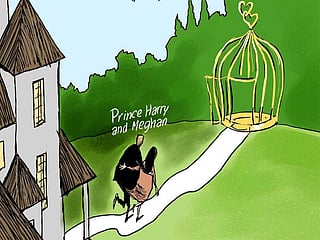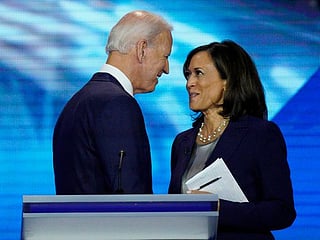Lebanon must get the right to determine its destiny
If the country’s polity is not fixed, countless other tragedies could strike the nation

Also In This Package
The sense of loss, ache and trauma that today defines the national sentiment of the Lebanese people, felt after tragedy struck in Beirut three weeks ago, continues to ripple through the social fabric of a bereaved nation.
Citizens of that long tormented country are now asking this of themselves: Why was this tragedy — which snuffed out close to 200 lives, injured thousands and left no part of the nation’s capital untouched, unscathed, unscarred — allowed to happen to us, how do we make sense out of that which seems senseless and, more importantly, what shall “we, the people” do next?
The consensus among large swaths of Lebanese society is that for Lebanon to be saved, for Lebanon to be whole as a nation, for Lebanon never to be again put through the agonies it has endured since 1975, the profound unbalance at the pivot of their political culture must giveFawaz Turki
Look, every nation has the inalienable right to go to hell in its own way, as it were, provided that is a projection of the collective sweep of its people’s sensibility. (Soviets, for example, opted for a Soviet Union and went with whatever floated their boat best, fine.)
But if that nation is dragged there, against its will, by the kind of unconscionable leaders who, as Fredrick Douglass, the African American reformer and orator, put it, claim for themselves “the crops that others had ploughed”, or who pursue parochial interests alien to the national interest, then the people will sooner or later exercise “the right to revolution” or, as it is also known in political philosophy, “the right to rebellion”.
The consensus among large swaths of Lebanese society is that for Lebanon to be saved, for Lebanon to be whole as a nation, for Lebanon never to be again put through the agonies it has endured since 1975, the profound unbalance at the pivot of their political culture must give.
In short, all members of the old guard, regardless of their sectarian, political and parochial affiliation, without exception, must lift anchor and sail away.
No doubt you hear in this preferred panacea an echo of the popular slogan, raised by protesters in the mass demonstrations held last year across the country, that declaimed, “All of them means all of them”. There’s no other way.
Also Read: Lebanon finds itself on the brink
Also Read: Eid in the times of a deadly pandemic
All of them must go. No hedging. No pouring of new sauces on old meats. This old guard, barren of invention, protective of its narrow interests, will only ensure that more human damnation is visited upon a people who have supped full of damnation.
The right to revolt or rebel against injustice, the right to send packing a government that acts against the commonwealth of the “body of the people”, was formalised by sundry political philosophers, all the way from Ibn Khaldun, the 14th century Islamic sociologist, to John Locke, the Enlightenment thinker — and beyond.
In fact, the Founding Fathers of the American Republic went further, writing in the Declaration of Independence (1776) that it was not just “the right” but “the duty” of citizens to remove rulers judged by them guilty of a “long train of abuses and usurpations”.
It was “the long train of abuses and usurpations” by Lebanon’s ruling elite that has long marred the future prospects of the nation and warped its social fabric.
Consider, as a case in point, how soon after tragedy struck in Beirut, it emerged that the country’s top leaders had been aware of the chemical stockpiles stored at the port and were warned — reportedly several times — about the dangers they posed, yet cavalierly opted to do zilch about it.
A culture of passing the buck
Against the backdrop of aid pouring into the country and of search and rescue crews flying in from around the world, a thorough and transparent investigation began last week aimed at not just learning the exact cause of the tragedy but also delving into the role played by officials representing the motley groups in the government — into who should be taken to task, who should be indicted, who should be meted out punishment to.
Among the investigators, it now transpires, are a team of FBI agents who arrived in Beirut recently.
Unquestionably, among those investigated will be Hezbollah, whose pervasive influence as the most powerful political and military force in the country will come under scrutiny.
The group stands at the centre of the public outrage being levelled at the hated elite — with some of the outrage surprisingly emanating from an increasing number of its own constituents.
To be sure, Hezbollah cannot be held solely responsible for the corruption and mismanagement that have bankrupted Lebanon, and subverted its socio-political life, but the group has undeniably played an outsize role in Lebanon’s free-for-all, devil-may-care, what’s-in-it-for-me patronage system.
What the Lebanese people are asking for is not much: The right to be a determining force in their destiny, which translates into an equitable social contract between ruler and ruled.
Denied that right, they are likely to have countless other tragedies — different in kind but the same in degree — as the one visited upon them three weeks ago.
That would be too calamitous a fate to await any people, anywhere.
— Fawaz Turki is a journalist, lecturer and author based in Washington. He is the author of The Disinherited: Journal of a Palestinian Exile.









